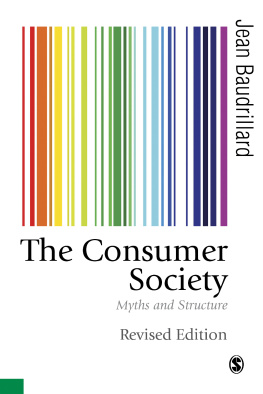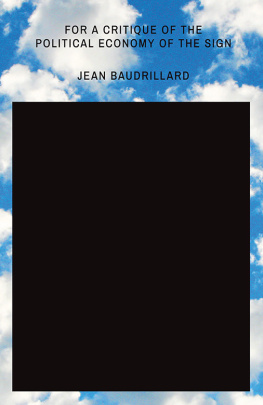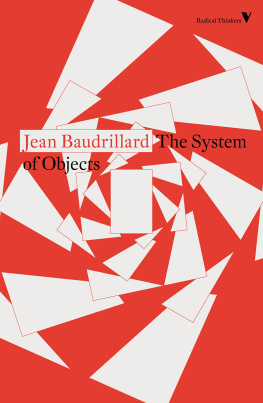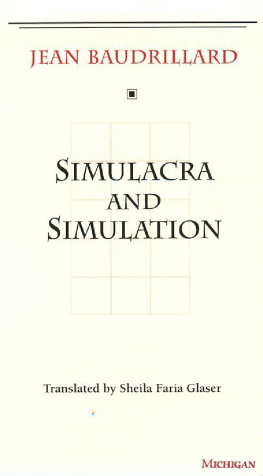Jean Baudrillard - Telemorphosis
Here you can read online Jean Baudrillard - Telemorphosis full text of the book (entire story) in english for free. Download pdf and epub, get meaning, cover and reviews about this ebook. year: 2011, publisher: Univocal, genre: Religion. Description of the work, (preface) as well as reviews are available. Best literature library LitArk.com created for fans of good reading and offers a wide selection of genres:
Romance novel
Science fiction
Adventure
Detective
Science
History
Home and family
Prose
Art
Politics
Computer
Non-fiction
Religion
Business
Children
Humor
Choose a favorite category and find really read worthwhile books. Enjoy immersion in the world of imagination, feel the emotions of the characters or learn something new for yourself, make an fascinating discovery.
- Book:Telemorphosis
- Author:
- Publisher:Univocal
- Genre:
- Year:2011
- Rating:3 / 5
- Favourites:Add to favourites
- Your mark:
- 60
- 1
- 2
- 3
- 4
- 5
Telemorphosis: summary, description and annotation
We offer to read an annotation, description, summary or preface (depends on what the author of the book "Telemorphosis" wrote himself). If you haven't found the necessary information about the book — write in the comments, we will try to find it.
Telemorphosis — read online for free the complete book (whole text) full work
Below is the text of the book, divided by pages. System saving the place of the last page read, allows you to conveniently read the book "Telemorphosis" online for free, without having to search again every time where you left off. Put a bookmark, and you can go to the page where you finished reading at any time.
Font size:
Interval:
Bookmark:
pharmakon

L levage de poussire and Tlmorphose
by Jean Baudrillard 2001 Sens & Tonka
Translated by Drew S. Burk
as Dust Breeding and Telemorphosis
Jason Wagner, Drew S. Burk
(Editors)
First Edition
Minneapolis 2013, Univocal Publishing
Published by Univocal
123 North 3rd Street, #202
Minneapolis, MN 55401
www.univocalpublishing.com
No part of this book may be reproduced or transmitted in any form or by any means, electronic or mechanical, including photocopying, recording or any other information storage or retrieval system, without prior permission in writing from the publisher.>
Thanks to Meredith Forbes, John Ebert, Hubert Tonka,
Jeanne-Marie Sens, Sylvre Lotringer and Marine Baudrillard
Cover design by Jason Wagner
Distributed by the University of Minnesota Press
ISBN 978-1-937561-07-9
Library of Congress Cataloging-in-Publication Data
A catalog record for this book is available from the
Library of Congress
table of contents
INTRODUCTION
Our entire reality has become experimental.
In the absence of any stable destiny, modern man has reached
the point of unlimited experimentation on himself.
- Jean Baudrillard
The art of living today has shifted to a continuous state of the experimental.
In one of his last texts, Telemorphosis, renowned thinker and anti-philosopher Jean Baudrillard takes on the task of thinking and reflecting upon the coming digital media architectures of the social. While the social may have never existed, according to Baudrillard, his analysis at the beginning of the 21 st century of the coming social media networked cultures cannot be ignored. One need not look far in order to find oneself snared within some sort of screenification of a techno-social community. What the most radical critical critique, the most subversive delirious imagination, what no Situationist drift could have done television has done. Collective reality has entered a realm of telemorphosis.
Baudrillard stares down what he identifies as the telemorphosis of reality within a culture, taken prisoner by its own fascination with itself: this cinematic coup dtat of the imaginary and the real, where banality and its celebratory status capture us all within self-referential spectacles of life and death. In a social mediated universe of parallel worlds of doubled up delirium between reality and its theatrical double, the screen, Jean Baudrillards insights into the political, social, and cultural structures of the 21 st century and its relationship to media have only begun to resonate with such anticipatory richness, that any thinker or cultural theorist today must have the courage to read (or return to) this prophetic thinker at the edge of the coming age of singularities, networks, and technical image production.
Reality television and more importantly its digital offspring such as social networking sites like Facebook or Google+ have led to a theatricality and fascination with banality that now more than ever needs to be taken seriously as mechanisms of individuation, self-surveillance, and the restructuring of desire become turned into carnival attractions of the highest order and we find ourselves returning to Spinozas famous question: of what is the body capable?
The political body, the social body, and digital body, all collectivities of the human today must pass through this telemorphosis of the screen.
Weve become individuated beings: non-divisible with others or ourselves. This individuation, which we are so proud of, has nothing to do with personal liberty; on the contrary, it is a general promiscuity. It is not necessarily a promiscuity of bodies in space - but of screens from one end of the world to the other. And it is probably screen promiscuity that is the real promiscuity: the indivisibility of every human particle at a distance tens of thousands of kilometers - like millions of twins who are incapable of separating from their double. Umbilicus limbo.
Umbilicus limbo. Artaud. The theatre and its double. Today we all dance the tango of the onscreen double. Baudrillard reminds us again that if one wants to avoid the traps of reality, one must move faster than it. And, as usual, Baudrillards gaze accelerates faster than reality.
There will soon be nothing more than self-communicating zombies, whose lone umbilical relay will be their own feedback image - electronic avatars of dead shadows who, beyond death and the river Styx, will wander, perpetually passing their time retelling their own story.
Yes, Jean, we know. We know the shadow stories are still singing. The encapsulation and self-confinement of the age of the screen world, even in its most mobile formats, becomes a reminder once again of the ecstasy of communication where everything is said, everything forgotten and where no one is speaking the same language.
Everyone knows that reality shows are edited image-scenarios, framed within a pre-fabricated context in order to elicit certain responses and fascination from the audience. But as we enter headlong into a media-sphere where everything arrives with a built-in banality switch, we find the scenario trickling its way into every aspect of existence. Realitys desire is to bathe in the banality of its own image feedback, and in achieving this it becomes hostage of its own feedback image. We must have the courage to rigorously question our own relationship to the deliriums of the self-referential closed-circuit exchanges. We must attempt to liberate ourselves from our own fascination with the lowest common denominator of existence: the banality of existence itself.
- Drew S. Burk
DUST BREEDING
Our entire reality has become experimental. In the absence of any stable destiny, modern man has reached the point of unlimited experimentation on himself.
Two recent illustrations of this can be seen: Loft Story, who provides the phantasmatic illusion of live sex.
Loft Story is, of course, a concept that has become universally accepted: a condensed version of a human amusement park, ghetto, solitary confinement, and Exterminating Angel. Voluntary reclusion as a laboratory of synthetic conviviality, of telegenetically modified sociality.
It is here, when everything has been given over to viewing (as in Big Brother and the other reality shows) that one perceives that there is nothing left to see. It is the mirror of flatness, of the zero degree, where, contrary to all objectives of a real which the show claims to show, it becomes the proof of the disappearance of the other, and perhaps even the fact that the human is not a social being. The equivalent of a readymade - an unchanged transposition like that of everyday life, which is itself already rigged by all the dominant models. A synthetic banality, fabricated within a closed circuit and under a controlled screen.
In this manner, the artificial microcosm of Loft Story is identical to Disneyland, which provides the illusion of the real external world, while if one looks deeper, one realizes they are one and the same. The entire United States is Disneyland and we are all on Loft Story. No need to enter into the idea of the virtual double of reality, we are already there - the televisual universe is nothing more than a holo-graphic detail of global reality. All the way up to, and including, the most daily parts of our existence, we are already within a situation of experimental reality. And it is precisely from this that we have the fascination, by immersion, of spontaneous interactivity. Are we dealing with a porno voyeurism? No. Sex can be found everywhere, but it is not what people want. What they profoundly desire is the spectacle of banality, which today has become the real pornography, the real obscenity - of nothingness, insignificance, and flatness. The complete opposite of the Theatre of Cruelty. But perhaps there is a form of cruelty which can be seen there as well, at least a virtual one. At a time when television and the media are less and less capable of accounting for the (unbearable) events of the world, they discover daily life, existential banality as the most deadly event, as the most violent actuality, even as the site of the most perfect crime. And actually... it is. And people are fascinated, fascinated and terrified by the indifference of the Nothing-to-say, Nothing-to-do, by indifference to their own existence. The contemplation of the Perfect Crime, of banality as a new vision of fatality, has become a real Olympic discipline, or the last avatar of extreme sports.
Next pageFont size:
Interval:
Bookmark:
Similar books «Telemorphosis»
Look at similar books to Telemorphosis. We have selected literature similar in name and meaning in the hope of providing readers with more options to find new, interesting, not yet read works.
Discussion, reviews of the book Telemorphosis and just readers' own opinions. Leave your comments, write what you think about the work, its meaning or the main characters. Specify what exactly you liked and what you didn't like, and why you think so.











